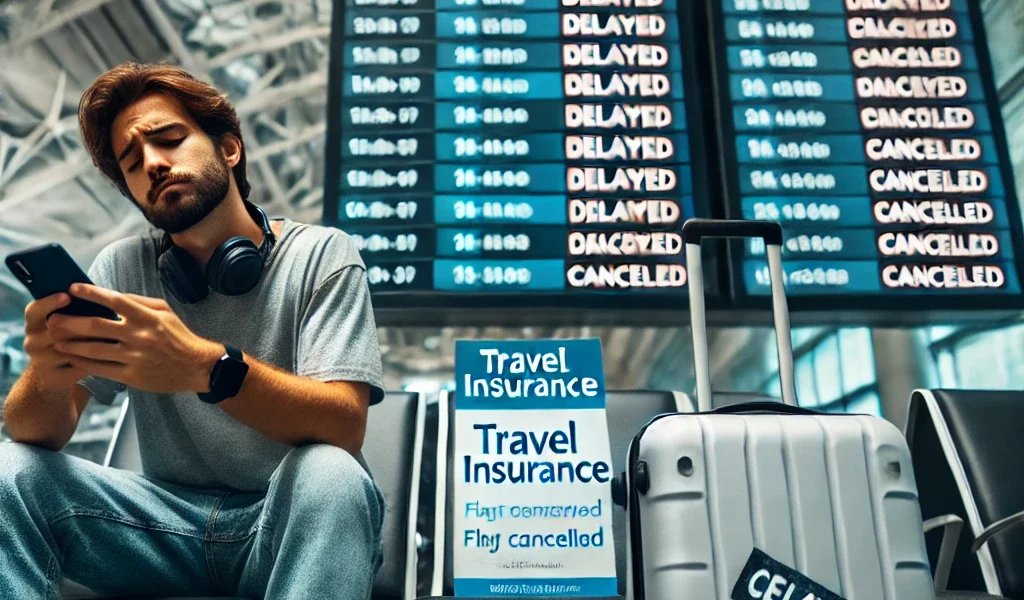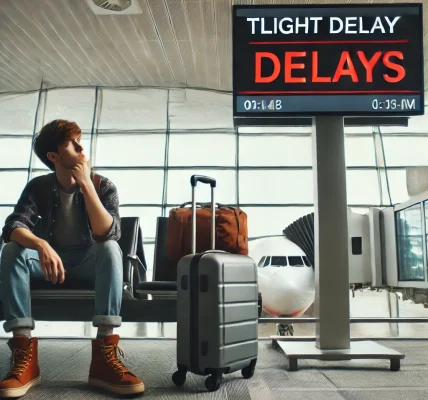Introduction
Flight delays and cancellations are among the most frustrating aspects of travel. Whether caused by weather conditions, technical issues, or airline staffing problems, these disruptions can lead to missed connections, extra expenses, and ruined travel plans. Fortunately, travel insurance can offer financial protection and peace of mind in these situations.
This article explores how travel insurance covers flight delays and cancellations, what travelers need to know before purchasing a policy, and how to maximize benefits when faced with unexpected disruptions.
What Causes Flight Delays and Cancellations?
Before understanding how travel insurance helps, it’s important to know the common reasons behind flight delays and cancellations:
- Weather Conditions: Heavy storms, hurricanes, or fog can cause significant delays.
- Technical Issues: Mechanical problems may lead to safety concerns, delaying flights.
- Airline Staffing Shortages: A lack of crew members can lead to last-minute cancellations.
- Air Traffic Congestion: High air traffic in busy airports often results in delays.
- Strikes or Operational Issues: Airline staff strikes or operational failures can disrupt schedules.
- Security Concerns: Threats or security alerts may ground flights unexpectedly.
How Travel Insurance Covers Flight Delays and Cancellations
1. Trip Delay Coverage
Travel insurance typically includes trip delay coverage, which reimburses travelers for additional expenses incurred due to extended flight delays.
What’s Covered?
- Hotel accommodations if the delay requires an overnight stay.
- Meal expenses during extended waiting periods.
- Transportation costs such as taxis or rideshares.
- Essential purchases (like toiletries or clothing) if baggage is delayed.
Example: If your flight is delayed for 12 hours due to weather and you need a hotel stay and meals, travel insurance can reimburse these costs up to the policy limit.
2. Trip Cancellation Coverage
If a trip is canceled for a covered reason, trip cancellation coverage helps recover non-refundable expenses like flights, hotel bookings, and tours.
What’s Covered?
- Airline ticket refunds for non-refundable fares.
- Prepaid hotel bookings, tours, and activity fees.
- Costs of rescheduling flights due to a covered cancellation reason.
Common Covered Reasons:
- Severe illness or injury preventing travel.
- Death of an immediate family member.
- Natural disasters or severe weather conditions.
- Airline bankruptcy or operational shutdowns.
Example: If you develop a serious illness before your flight and need to cancel, your travel insurance policy may reimburse you for prepaid, non-refundable expenses.
3. Trip Interruption Coverage
If a trip is interrupted after departure due to unforeseen circumstances, trip interruption coverage helps cover additional costs or losses.
What’s Covered?
- The cost of a new flight home if your trip is cut short.
- Unused, non-refundable travel expenses.
- Extra accommodation and transport costs for emergency returns.
Example: If an emergency back home requires you to cut your trip short, trip interruption insurance can help pay for the sudden flight changes.
4. Missed Connection Coverage
For travelers with connecting flights, a missed connection due to airline delays can be costly. Missed connection coverage helps recover expenses related to rebooking flights and accommodations.
What’s Covered?
- The cost of rebooking a missed connecting flight.
- Extra accommodation and meal expenses during the wait.
- Alternative transportation options (like train tickets) to reach the destination.
Example: If your initial flight is delayed, causing you to miss an international connection, your travel insurance policy may cover the cost of rebooking.
What Travel Insurance Does NOT Cover
While travel insurance provides substantial protection, it does not cover every situation. Understanding the exclusions is crucial.
Common Exclusions:
- Delays under the minimum time threshold (typically less than 6–12 hours).
- Cancellations due to personal choice (e.g., changing plans without a covered reason).
- Lack of proper documentation (e.g., missing a flight due to expired passport).
- Flights canceled by the airline with full refunds (since the airline already compensates you).
- Delays due to foreseeable events (e.g., booking a flight during hurricane season without considering risks).
Tip: Always read your travel insurance policy carefully to know exactly what is covered and what is excluded.
How to Claim Travel Insurance for Flight Delays and Cancellations
If your flight is delayed or canceled, follow these steps to file a successful travel insurance claim:
- Keep All Documentation
- Save your flight ticket, boarding passes, and booking receipts.
- Request a delay or cancellation confirmation from the airline.
- Track Expenses
- Keep all receipts for food, accommodation, and transport costs incurred during the delay.
- Contact Your Insurance Provider
- Report the delay or cancellation as soon as possible.
- Follow their claim submission process and provide necessary documents.
- Submit Your Claim Promptly
- Most policies have a deadline for submitting claims (e.g., within 30 days of the incident).
Tip: Some insurers offer mobile apps to file claims quickly and easily.
Choosing the Right Travel Insurance for Flight Delays
When selecting a travel insurance policy, consider these key factors:
- Delay reimbursement limit: Ensure the policy provides sufficient coverage for accommodations and meals.
- Minimum delay period: Check the required delay time before coverage kicks in.
- Coverage for airline-caused cancellations: Some policies cover airline bankruptcy or financial default.
- 24/7 customer support: Choose insurers that offer round-the-clock assistance.
Best Practice: Compare multiple policies and read customer reviews to find the best travel insurance plan for flight delays and cancellations.
Conclusion
Flight delays and cancellations are an unavoidable part of travel, but they don’t have to result in financial loss or stress. Travel insurance provides a safety net, covering additional expenses and helping you recover non-refundable costs when flights are delayed or canceled.
By understanding how travel insurance works and choosing a policy that suits your needs, you can travel with confidence, knowing you’re protected against unexpected disruptions.




